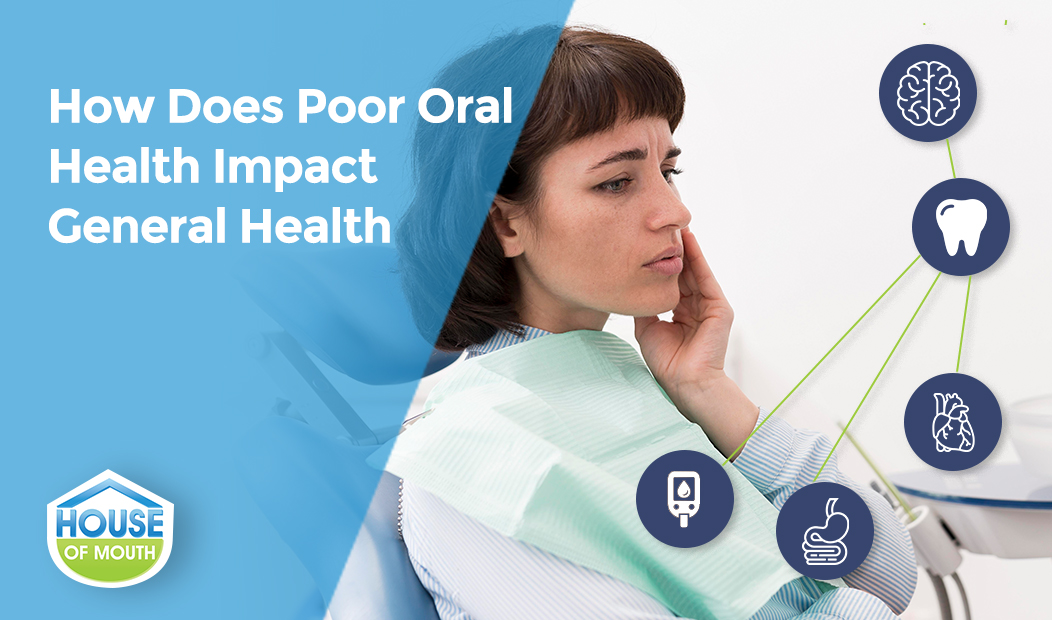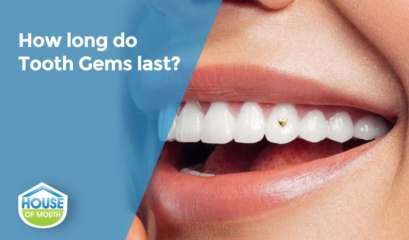Dental Health Week 2023 is on August 7-13, and the theme this year is ‘Keep your smile for life’, with a focus on how poor oral health can impact general health. Specifically, the focus is on how gum disease can negatively affect some of the most common diseases affecting us today:
- Type 2 diabetes
- Adverse pregnancy outcomes
- Heart diseases
- Gut issues
- Lung conditions
- Alzheimer’s disease
So let’s look at the research around how gum disease can affect each of these outcomes in celebration of Dental Health Week! It always helps to be more informed.
Diabetes and Oral Health
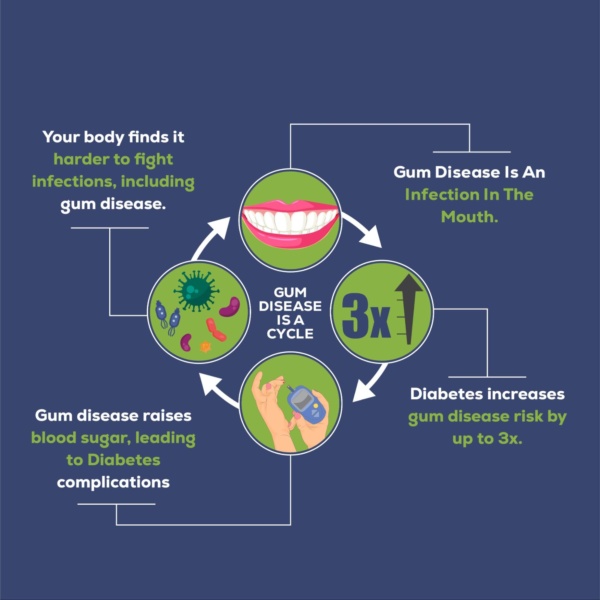
People with diabetes, specifically Type 2, are more susceptible to a range of oral health issues due to the nature of the disease, which impacts the body’s ability to process sugar. Some oral health manifestations associated with diabetes include dry mouth, fungal infections, poor healing of oral tissues, taste disturbances, and increased susceptibility to infections. However, the most significant oral health concern for people with diabetes is periodontal disease, commonly known as gum disease.
Several studies have found a robust two-way link between periodontal disease and diabetes. On the one hand, diabetes increases the risk of developing periodontal disease due to increased susceptibility to infections. On the other hand, severe periodontal disease can make it harder to control blood sugar levels, making the management of diabetes more challenging.
Despite the solid body of evidence supporting this relationship, there is a noticeable lack of awareness regarding the link between oral health and diabetes. This lack is prevalent not only among patients with diabetes but also among other healthcare professionals. As such, there’s a pressing need for increased education among treating physicians about the various oral manifestations of diabetes. Early diagnosis is key, and being aware of these issues allows for timely referrals to oral health specialists. This is why the efforts of the ADA and Dental Health Week are so valuable!
We encourage everyone, especially those living with diabetes, to make oral health a priority in their overall health regimen. Remember, a healthy mouth is a crucial step towards a healthier life.
Oral Health During Pregnancy
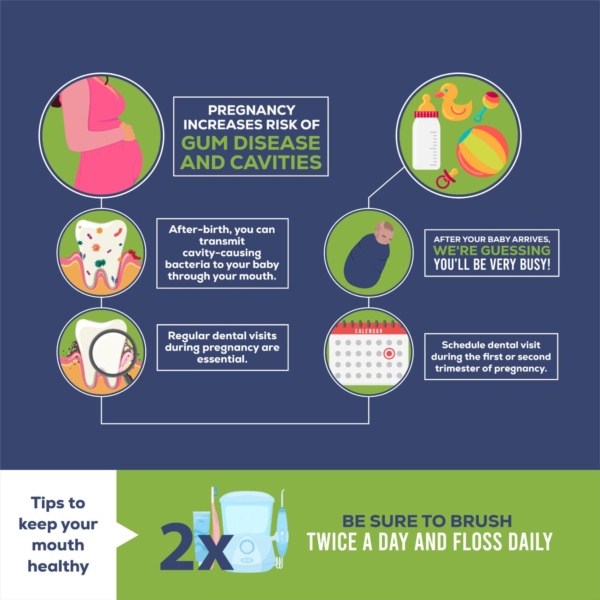
Evidence suggests that poor maternal oral health can increase the risk of infants developing early caries (tooth decay) and is strongly associated with adverse pregnancy outcomes. This includes preterm births and low birth-weight babies – conditions that can lead to a host of complications for the newborn.
Despite the weight of these findings, it’s concerning to note that Australia currently lacks structured preventive strategies specifically aimed at preserving the oral health of pregnant women. This lack contrasts sharply with many developed nations that have proactively implemented preventive strategies, often engaging non-dental professionals like prenatal care providers in this crucial mission.
Dental Health Week serves as an opportune moment to shed light on these critical issues and advocate for better oral health care for pregnant women. Remember, a healthy mouth is not just an individual concern but also a shared responsibility that can shape the future health of our next generation.
Link Between Heart Disease and Dental Health
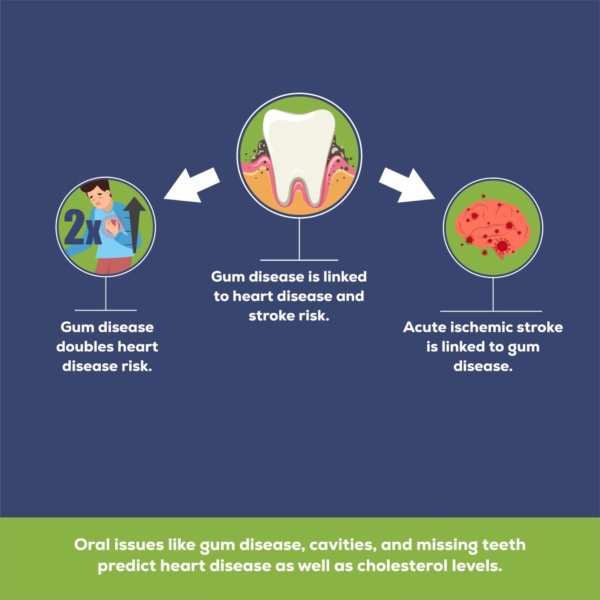
The connection between gum disease and heart disease has been a subject of scientific interest for years. Gum disease, or periodontal disease, originates when a sticky film of bacteria known as plaque accumulates around teeth. On the other hand, a different type of plaque composed of fats, cholesterol, calcium and other blood constituents can build up within arteries, leading to a condition known as atherosclerosis, a prominent feature of coronary artery disease.
People suffering from gum disease have been observed to be two to three times more likely to experience a heart attack, stroke or other severe cardiovascular event. However, the association doesn’t necessarily imply causality, as many individuals with heart disease maintain healthy gums, and not everyone with gum disease develops heart conditions. Shared risk factors such as smoking and an unhealthy diet could potentially account for this association. Nevertheless, emerging evidence hints at gum disease possibly being an independent risk factor for heart disease.
At the core of this connection lies the process of inflammation. In response to harmful irritants or infections, our body triggers acute inflammation to prompt healing. But when this inflammation persists over the long term, it can contribute to several health problems, including atherosclerosis.
The intersection of oral health and cardiovascular health is complex, and as more research unravels this connection, it becomes ever more evident that good oral hygiene practices are an integral part of general health.
Oral Health and Gut Health
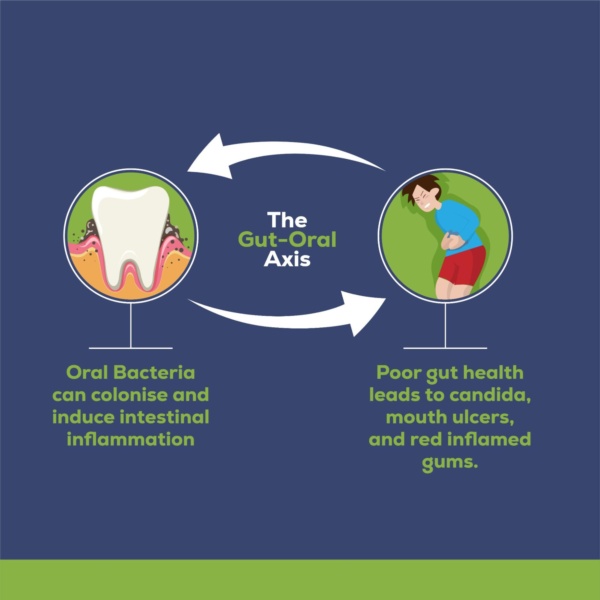
The connection between gum disease and heart disease has been a subject of scientific interest for years. Gum disease, or periodontal disease, originates when a sticky film of bacteria known as plaque accumulates around teeth. On the other hand, a different type of plaque composed of fats, cholesterol, calcium and other blood constituents can build up within arteries, leading to a condition known as atherosclerosis, a prominent feature of coronary artery disease.
People suffering from gum disease have been observed to be two to three times more likely to experience a heart attack, stroke or other severe cardiovascular event. However, the association doesn’t necessarily imply causality, as many individuals with heart disease maintain healthy gums, and not everyone with gum disease develops heart conditions. Shared risk factors such as smoking and an unhealthy diet could potentially account for this association. Nevertheless, emerging evidence hints at gum disease possibly being an independent risk factor for heart disease.
At the core of this connection lies the process of inflammation. In response to harmful irritants or infections, our body triggers acute inflammation to prompt healing. But when this inflammation persists over the long term, it can contribute to several health problems, including atherosclerosis.
The intersection of oral health and cardiovascular health is complex, and as more research unravels this connection, it becomes ever more evident that good oral hygiene practices are an integral part of general health.
Oral Health and Lung Disease
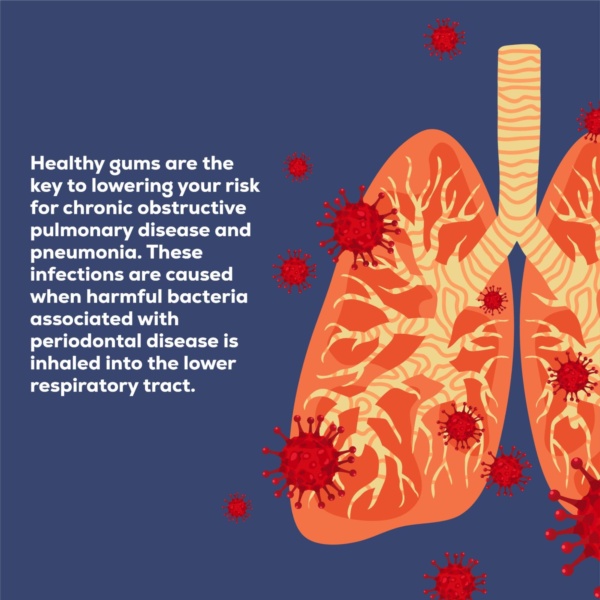
Research shows that problems in your mouth, such as cavities and gum disease, can have significant impacts on your lungs.
Cavities and gum infections, known as gingivitis, are caused by bacteria. Your teeth and gums can serve as reservoirs for these bacteria, which can then travel down to your lungs and potentially cause harm. This can occur when the bacteria that live in dental plaque – a film that forms on your teeth – are inhaled into your lungs via tiny droplets of saliva.
Normally, healthy lungs have defences to deal with these bacterial ‘invasions’. However, in lungs that have been damaged by disease, these protective mechanisms may not be as effective. This makes it easier for the bacteria to cause infections or exacerbate existing lung problems.
Alzheimer's and Oral Health
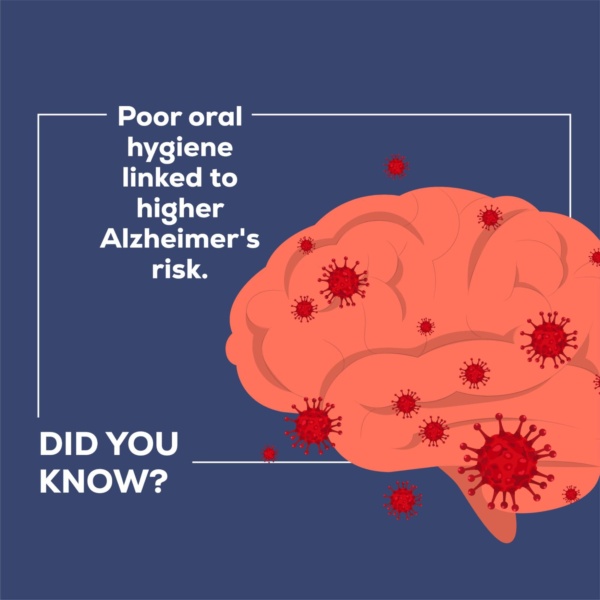
One of the most common bacteria causing gum disease, Porphyromonas gingivalis, has been strongly associated with Alzheimer’s disease. This bacterium, alongside others like Campylobacter rectus and Prevotella melaninogenica, can cause oral infections that, if not treated, can travel from the mouth to other parts of the body, including the brain. This mechanism is believed to influence the development of Alzheimer’s and other forms of dementia.
Moreover, there’s evidence that beta-amyloid protein plaques, a significant hallmark of Alzheimer’s, might be produced as a response to oral bacterial infection. Thus, maintaining oral health could be a vital step in managing Alzheimer’s risk.
However, research in this area is still ongoing, and we need to understand more about the complexities of these connections. But it’s clear that good oral hygiene practices – such as brushing and flossing regularly, maintaining regular dental check-ups, and promptly treating any oral infections – are not just about preserving our oral health, but they might also help in protecting our cognitive health.
Keep Your Oral and General Health in Top Shape With The House Of Mouth
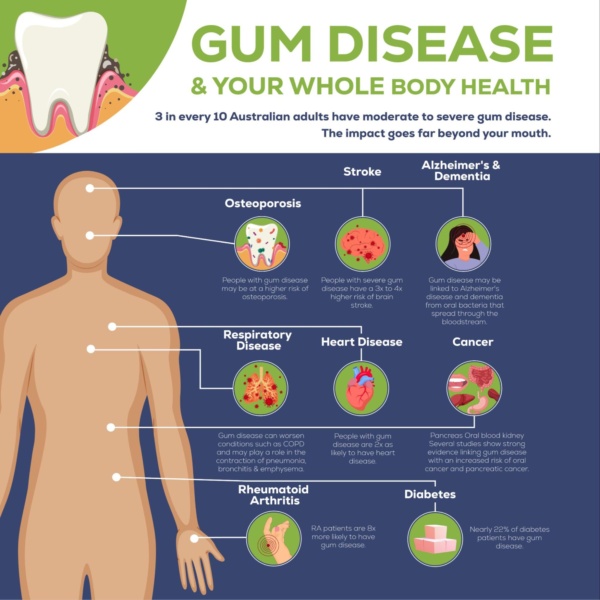
Our oral health plays a pivotal role in our overall well-being, with implications for conditions such as diabetes, heart and lung diseases, Alzheimer’s, pregnancy outcomes, and even our gut health. With this understanding, it’s clear that adopting effective oral hygiene habits, such as regular brushing, flossing, and dental check-ups, are vital steps to take.
By choosing The House Of Mouth for your dental care needs, you’ll be making a positive investment in your oral health and, in turn, your broader health landscape. Our expert team can guide you towards improved oral health, leading to wide-ranging benefits for your general wellness. Remember, a healthy mouth is much more than just a winning smile; it’s a gateway to your overall health. Explore our range of oral care products today.


